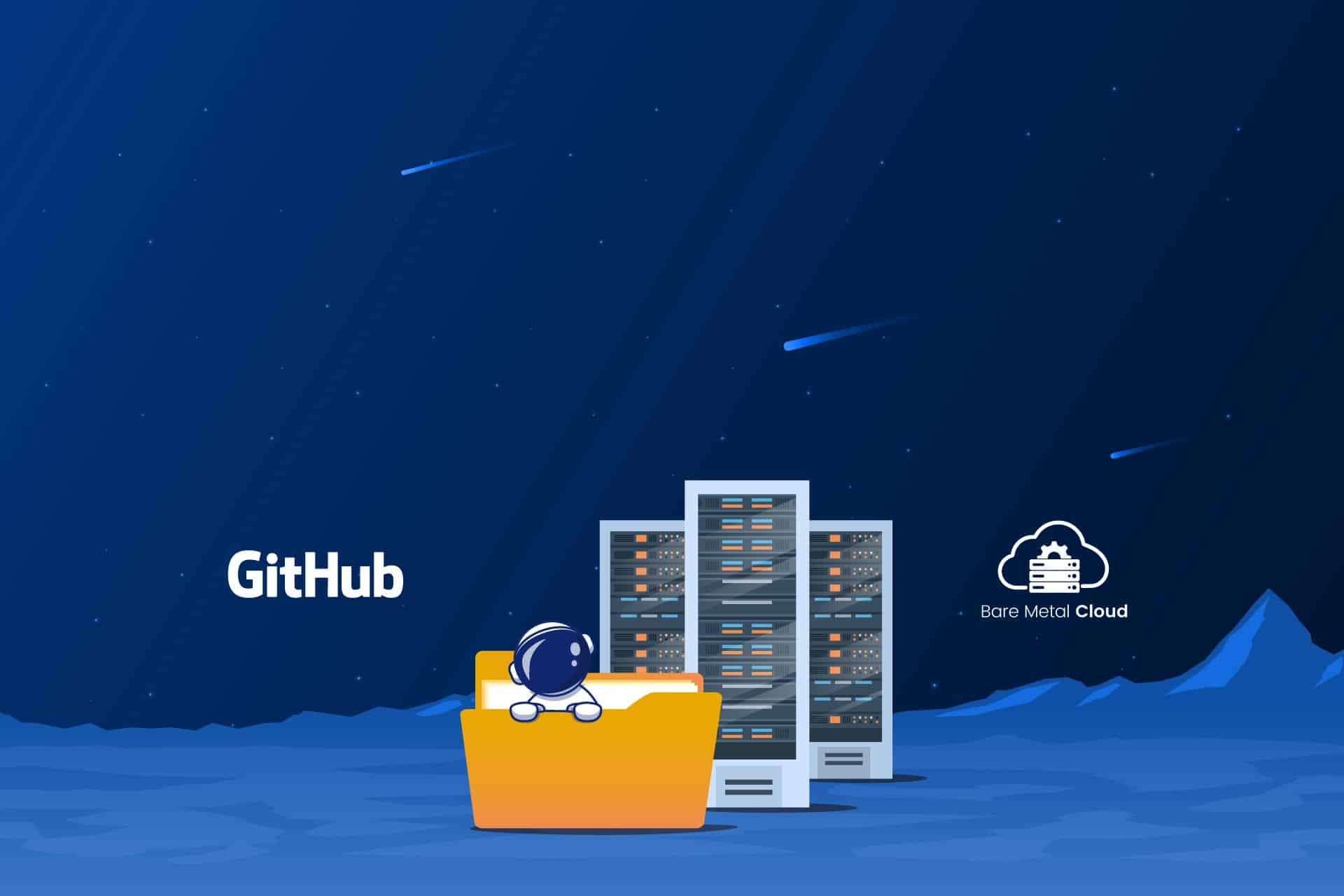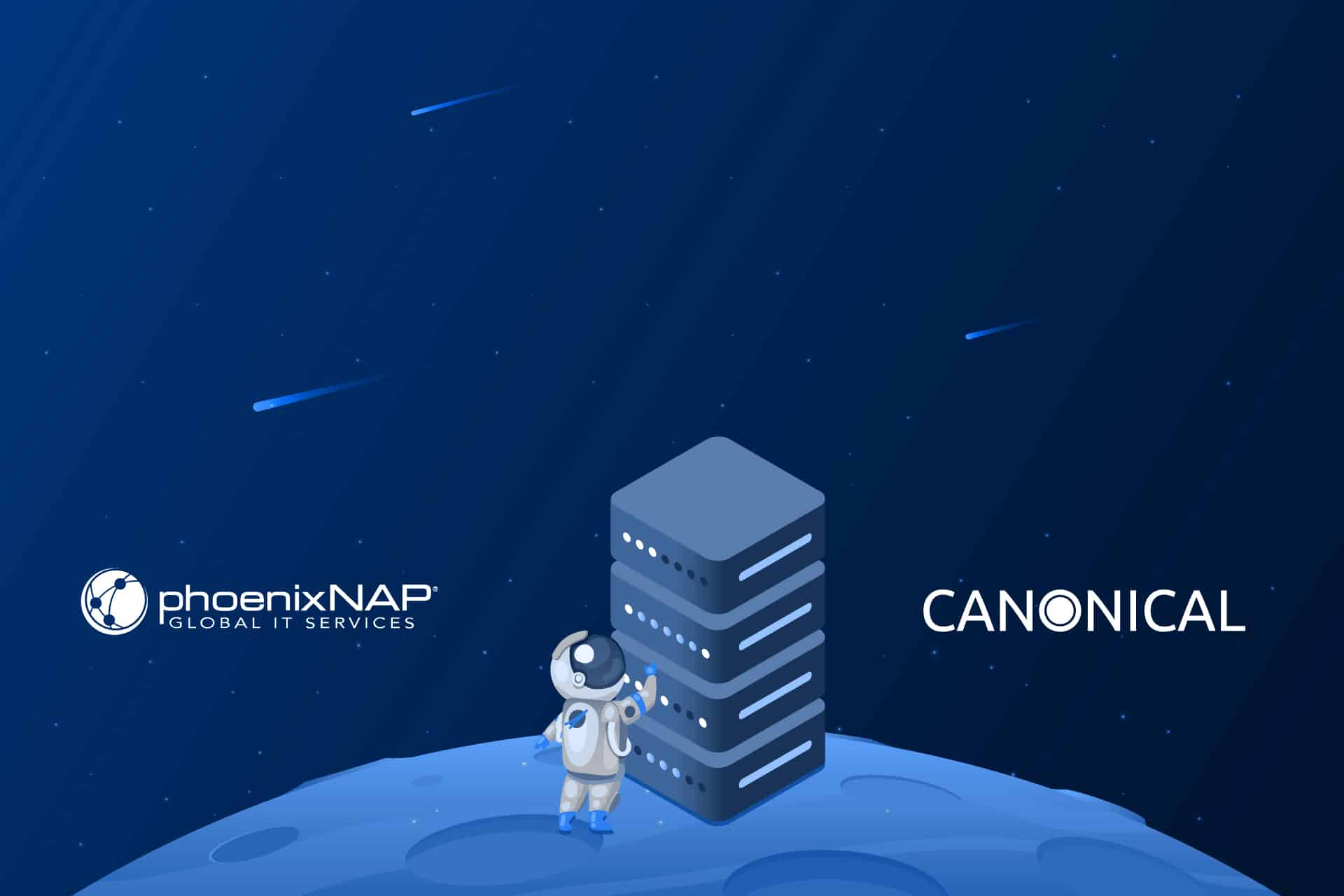September 2022 marks the 2nd anniversary of our Bare Metal Cloud (BMC) platform. Since it became generally available, the API-driven platform has hit multiple milestones. It began its journey as an on-demand bare metal infrastructure DevOps teams can use to accelerate their software delivery pipelines. Today, organizations leverage Bare Metal Cloud for anything from global and edge resource bursting in minutes to one-click deployments of production-ready Kubernetes environments.
To celebrate its upcoming anniversary, this article will outline the latest platform updates and share more details on its progress, highlighting how you can leverage it for your particular use case.
For more information on the platform, read our What is Bare Metal Cloud article!
Edge Location Launch: 10-Millisecond Access to Bare Metal Cloud
Recognizing the importance of having powerful, pre-configured compute resources as close to your data source as possible, we partnered with American Tower to launch our first edge location in Austin, Texas.
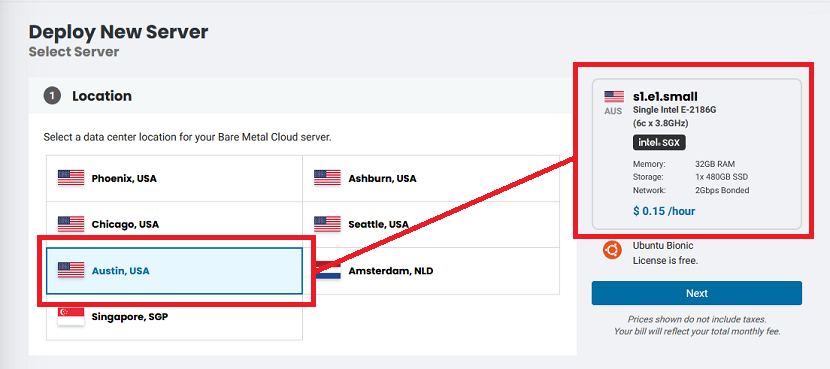
By improving Bare Metal Cloud availability, we’ve enabled users in the US Southwest 10 ms access to globally interconnected, Kubernetes-ready servers. Leveraging 5G connectivity of the strategically-located edge data center, the platform now supports next-generation workloads and grants businesses access to high-bandwidth, low-latency technologies.
"The launch of our first edge location is a major milestone, opening doors to other similar implementations that we are currently planning. We also hope to simplify infrastructure management for DevOps teams through the improved Kubernetes capabilities that we recently released. Furthermore, our network updates are designed to enable more streamlined management, while the release of new GitHub repositories delivers code access to anyone interested in customizing the platform."
Ron Cadwell, CEO of phoenixNAP, LLC
Using the Megaport Cloud Router, you can easily create multiple virtual layer 3 private connections from the edge to a range of other Bare Metal Cloud locations across the US. This helps you further accelerate your transfer speeds and improve infrastructure connectivity.
Benefits of using Bare Metal Cloud Edge instances include:
- Lower data transfer latency.
- Accelerated data transfer to other Bare Metal Cloud locations.
- Improved performance for live data streams and real-time analytics.
- Smoother user experience for your applications.
- Hardware-level data security with Intel SGX and 20 Gbps DDoS protection.
- No infrastructure upkeep – managed rack, power, cooling, and security.
You can select an edge instance based on your needs and have your infrastructure up and running in 60 seconds. If your selected instance is not available at your preferred location, the Bare Metal Cloud portal now lets you choose alternative server deployment locations in just one click.
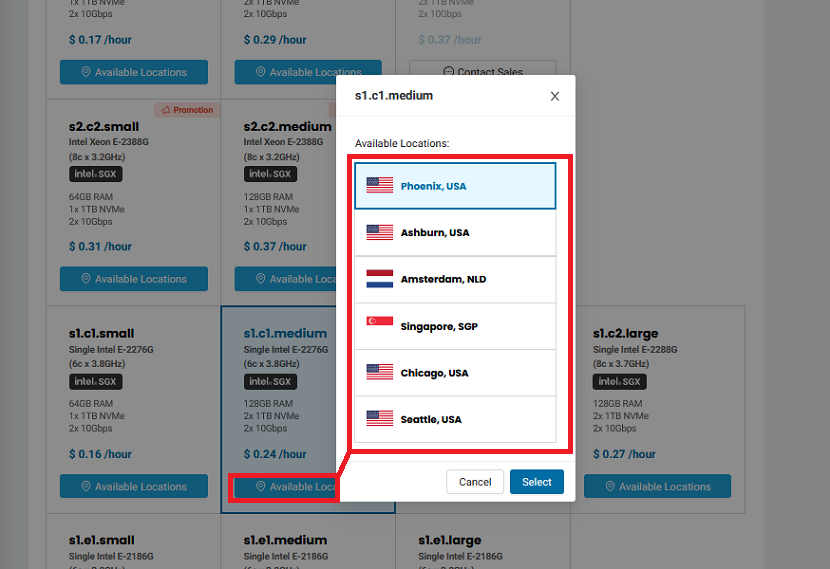
Available in 6 locations across the US, Europe, and Asia and with multiple locations coming soon, Bare Metal Cloud continues bringing compute resources right where you need them.
SUSE Rancher Integration: High Availability K8s Cluster Environment in under 5 minutes
In July 2021, we launched Bare Metal Cloud instances with SUSE Rancher integration with the goal of helping developers save hours of work required to build a container services platform from scratch. Simplifying the creation of single-node management clusters, the solution was ideal for K8s adoption or Kubernetes software-testing purposes.
In the meantime, SUSE Rancher on Bare Metal Cloud has evolved into an out-of-the-box enterprise Kubernetes infrastructure solution suitable for anything from sandboxing to Day 2 operations. The latest phase of the platform’s development introduced streamlined provisioning of a geo-distributed single or multi-node workload cluster alongside its management cluster. This feature gives organizations turnkey access to a resilient, global container environment running on the latest, dedicated hardware.
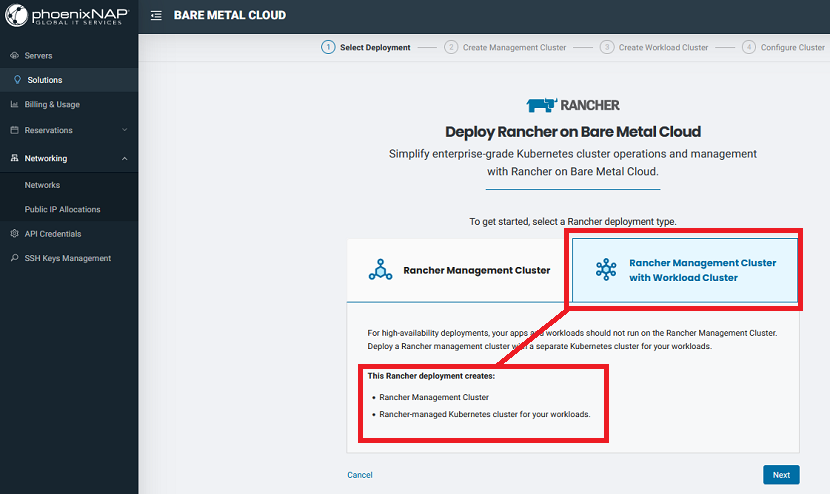
The solution deployment procedure takes less than 5 minutes and requires just a couple of clicks from within the intuitive Bare Metal Cloud portal or a single POST request via the platform’s API.
With no infrastructure setup overhead, the solution lets you do the following:
- Deploy a pre-configured 1 or 3-node management cluster.
- Deploy a 1 or 3-node workload cluster at the same or different location.
- Manage public IP allocations for each node.
- Add private keys or certificates for your cluster.
- Set access tokens, TLS settings, node taints, and domain names.
- Schedule regular cluster backup snapshots.
- Get 15 TB free bandwidth pool for all nodes at the same location.
The solution deploys clusters on the user’s default backend network and automatically assigns respective Kubernetes roles and tags for easy distinction and management of provisioned resources. After provisioning the workload cluster, users can additionally scale and tweak their nodes via the easily accessible Rancher UI.
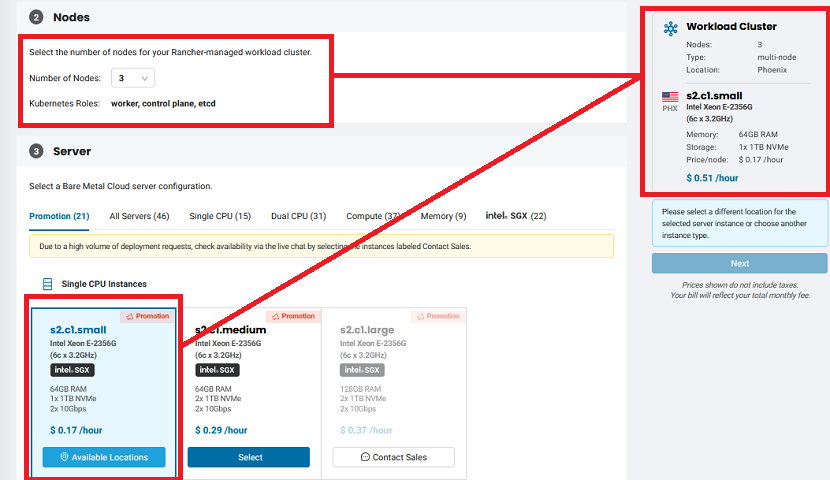
DevOps teams can also leverage Bare Metal Cloud’s integration with popular IaC tools to automate provisioning and management of their high-availability, enterprise Kubernetes infrastructure. You can manage Bare Metal Cloud as code using Terraform and Pulumi providers or Ansible modules available and regularly updated on phoenixNAP’s GitHub Page.
GitHub Updates: Go and Python SDKs
Open-source software continues to fuel the cloud-native architecture of Bare Metal Cloud. In return, phoenixNAP continues to give back to the community by constantly updating and expanding its GitHub repositories.
In our continued effort to build and maintain a comprehensive code library on GitHub, we have developed SDKs for Python and Go. Developers can use them to dive deeper into the technology powering Bare Metal Cloud, integrate it into their own deployments, and expand it to their use cases.
The SDKs allow for interacting with the platform via its APIs to perform the following:
- Read audit log entries to track API calls and WebUI activities.
- Provision, decommission, or reboot your servers, get SSH keys, and more.
- Create, list, edit, and delete private networks.
- Request and delete IP blocks.
- Deploy SUSE Rancher-managed K8s clusters.
- Assign tags to groups and categorize deployed resources.
Apart from Go and Python SDKs, phoenixNAP’s Bare Metal Cloud GitHub contains an official SDK for Ruby as well, making it easy to interact with the platform’s API without switching to another language.
You can choose from more than 40 pre-configured Bare Metal Cloud instances and deploy dedicated resources from the core to the edge in just a few clicks.
Introduction of Public Network IP Blocks
Traditionally, private IP addresses were automatically assigned to Bare Metal Cloud servers. To offer you more flexibility when choosing IP blocks and the number of IP addresses to assign to your deployments, phoenixNAP has introduced the public IP allocation feature.
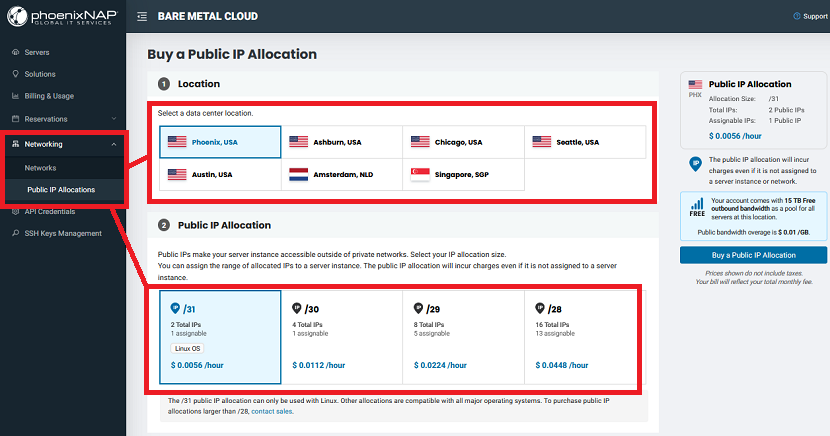
Using the BMC portal or API, you can now easily purchase public IP blocks at different data center locations during the server deployment process and enable server access beyond private networks.
Public IP blocks are purchased and billed separately. Depending on your needs, buy up to 16 IPs, 13 of which are assignable. Also, you can choose to keep an IP block even when you decommission the server it was previously assigned to and reassign it to a new deployment.
Additionally, the new feature lets you assign public IP allocations not only to servers but to your public network as well. This additionally adds to the flexibility of network deployments on the platform. Whether you want to use your API-driven servers on a highly secure private network or access them over the Internet, Bare Metal Cloud makes network definition and management easy.
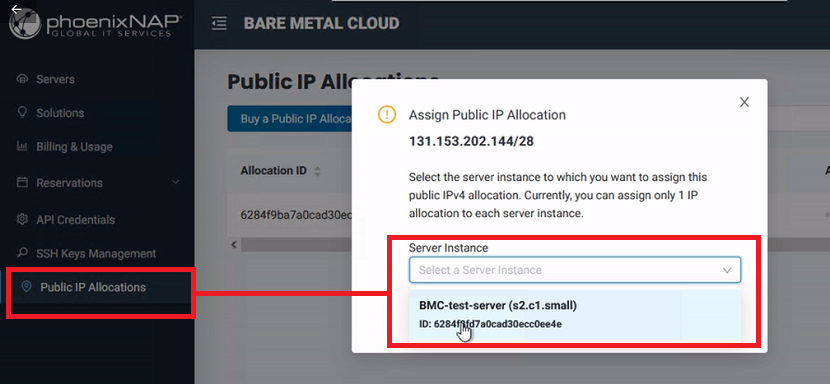
Simplified Network Management with IP Tagging
With the introduction of public IPs in Bare Metal Cloud, we’ve added the option to tag your IP blocks for filtering purposes and improved visibility of your server and network deployments. Similar to the existing server tagging feature, you can assign metadata to IP blocks to easily categorize them based on their location, environment, purpose, etc.
The tagging option lets you:
- Fetch existing tags to get an overview of tag assignments
- Filter existing IP blocks based on assigned tags
- Override existing tags with new ones
For example, you can assign a name and value to your newly deployed IP block based on its deployment location or the environment you intend to use it in.
BYOIP for Easier Platform Migration
We have also introduced the Bring Your Own IP (BYOIP) option to Bare Metal Cloud. You can now import your existing IP blocks instead of purchasing new ones from phoenixNAP.
The new feature helps you align your new infrastructure with your existing security, management, and deployment policies.
The feature enables smooth migration to Bare Metal Cloud for organizations that:
- Use their own IP pools for load balancers, web servers, or similar deployments
- Have existing architectural dependencies on specific IP addresses
- Use devices with hardcoded IPs
- Rely on services using trusted, contiguous IPs as contact points
Upon confirmation of your IP block’s validity and ownership, it can be easily imported into Bare Metal Cloud and managed both via the BMC portal or the platform’s API.
Read our tutorial to learn how to Configure BMC Server to Work with New Public IP Block!
The Evolution Continues
As one of the most versatile products from phoenixNAP’s portfolio, Bare Metal Cloud keeps evolving. What remains constant is that this API-first platform offers easily consumable dedicated servers that let DevOps teams get their code out faster while helping their organizations optimize their IT spend.
As we further push the boundaries of Bare Metal Cloud to help cloud-native organizations tackle the challenges of modern IT, we look forward to sharing more exciting news with you.
You can deploy Bare Metal Cloud in under 60 seconds and try it out for as low as $0.08/hour! Get started, log into the BMC portal!


